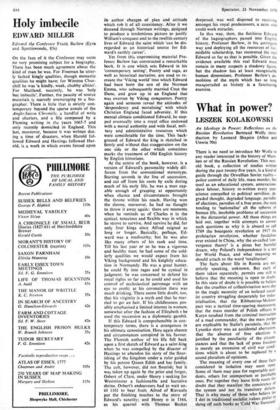Holy imbecile
EDWARD MILLER
Edward the Confessor Frank Barlow (Eyre and Spottiswoode, 85s) On the face of it the Confessor may seem no very promising subject for a biography. There has been much agreement about the kind of man he was. For Freeman he utter- ly lacked kingly qualities, though monastic qualities he might have; for Winston Chur- chill he was 'a kindly, weak, chubby albino'. For Maitland, succintly, he was 'holy but imbecile'. Further, the paucity of source materials is scarcely encouraging to a bio- grapher. There is little that is strictly con- temporary beyond the sparse annals of the Anglo-Saxon Chronicle, a handful of writs and charters, and a life composed by a Fleming writing in the years 1065-7 and only recently domiciled in England. This last, moreover, because it was written dur- ing a time of disasters, when Harold fol- lowed Edward and Hastings followed Har- old, is a work in which events forced upon its author changes of plan and attitude which rob it of all consistency. After it we
descend through Norman writings, designed to produce a tendentious picture to justify William's conquest and to the twelfth-century lives of Edward the saint which `can be dis- regarded as an historical source for Ed- ward's earthly career'.
Yet from this unpromising material Pro- fessor Barlow has constructed a remarkable book. It is one which sets Edward in his `contemporary setting'. Poetry and saga, as well as historical narrative, are used to re- create the 'Viking world' into which Edward had been born the son of the Norman Emma. who subsequently married Cnut the Dane, and grew up in an England that was overrun by Viking conquerors. Poetry again and sermons reveal the attitudes of `despondency and moralising' with which Christian England faced adversity. If this mental climate conditioned Edward, he step- ped eventually into a royal office endowed with a moral authority and with fiscal, mili- tary and administrative resources which were considerable for the time. This back- ground of Edward the king is sketched in firmly and without that exaggeration on the one side or the other which sometimes marks the treatment of Old English history by English historians.
At the centre of the book, however, is a version of Edward's personality widely dif- ferent from the conventional stereotype. Starting seventh in the line of succession, and cut off from his roots by exile during much of his early life, he was a man cap- able enough of grasping at opportunity when chance and circumstances brought the throne within his reach. Having won the throne, moreover, he had no thought to throw it away again: there are moments when he reminds us of Charles tt in the cynical, tenacious and flexible way in which he strove to survive. And survive he did, for only four kings since Alfred reigned as long or longer. Basically, perhaps, Ed- ward was a mediocrity; but he was also like many others of his rank and time. Till his last year or so he was a vigorous and healthy man; he had some of the sold- ierly qualities we would expect from his Viking background and his knightly educa- tion in Normandy. He was a great hunter, he could fly into rages and be cynical in judgment; he was concerned to defend his royal rights so far as he could and used his control of ecclesiastical patronage with an eye to profit; at his coronation there was much drinking. There seems little doubt, too, that his virginity is a myth and that he mar- ried to get an heir. If his childlessness pos- sibly emphasised a limited interest in women, somewhat after the fashion of Elizabeth t he used the succession as a diplomatic gambit.
If this Edward is comprehensible in con- temporary terms, there is a strangeness in his ultimate canonisation. Here again chance and circumstances conspired in his favour. The Flemish author of his life fell back upon a first sketch of Edward as a saint-king when he was compelled by the disaster of Hastings to abandon his story of the flour- ishing of the kingdom under a ruler guided by his patron Queen Edith and her family. The cult, however, did not flourish; but it was taken up again by the prior and forger, Osbert of Clare, under Henry t seeking for Westminster a fashionable and lucrative shrine. Osbert's endeavours had to wait un- til 1161 to bear fruit; Ailred of Rievaulx put the finishing touches to the story of Edward's sanctity; and Henry ti in 1164, as his quarrel with Thomas Becket deepened, was well disposed to receiving amongst his royal predecessors, a saint who could work miracles.
In this way, then, the fictitious Edward of the hagiographers passed into English history. Professor Barlow, in his astringent way and deploying all the resources of for- midable scholarship, has recovered the real Edward so far as that is possible. Given the evidence available this real Edward must remain in many respects a shadowy figure. but the shadow has at least recognisable human dimensions. Professor Barlow's de- molition of the myth which has so long masqueraded as history is a fascinating exercise.














































 Previous page
Previous page